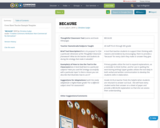
Cover Sheet
Teacher Example
Template
- Subject:
- Arts and Humanities
- Business and Communication
- Education
- History
- Life Science
- Mathematics
- Social Science
- Material Type:
- Activity/Lab
- Date Added:
- 07/06/2019

Cover Sheet
Teacher Example
Template
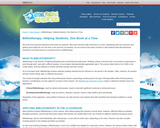
This article provides an overview of how teachers can use bibliotherapy to help students deal with social, emotional, and behavioral issues.

This resource is a video abstract of a research paper created by Research Square on behalf of its authors. It provides a synopsis that's easy to understand, and can be used to introduce the topics it covers to students, researchers, and the general public. The video's transcript is also provided in full, with a portion provided below for preview:
"Every adult can make a difference in the lives of the young people around them Natural mentors -- extended family, neighbors, teachers, or friends -- who are trustworthy and consistent can help youth feel more confident and supported when facing stressful events A recent meta-analysis supports the vital role that caring adults play in kids' education, vocational performance, and emotional health, by fostering positive development and helping kids avoid the risks associated with the tumultuous years of adolescence Youth lacking these relationships can become isolated, and face psychological and emotional problems Teaching our kids ways to recruit natural mentors -- and encouraging adults to more freely share their social resources -- might just transform young lives Levi van Dam. “Does Natural Mentoring Matter? A Three Level Meta-analysis on the Association between Natural Mentoring and Youth Outcomes”. American Journal of Community Psychology (2018)..."
The rest of the transcript, along with a link to the research itself, is available on the resource itself.
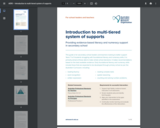
This guide is for secondary school leaders and teachers looking to better support Years 7 to 9 students struggling with foundational literacy and numeracy skills. It is primarily aimed at those able to make whole-school decisions. It makes recommendations based on the best available evidence.
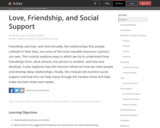
Friendship and love, and more broadly, the relationships that people cultivate in their lives, are some of the most valuable treasures a person can own. This module explores ways in which we try to understand how friendships form, what attracts one person to another, and how love develops. It also explores how the Internet influences how we meet people and develop deep relationships. Finally, this module will examine social support and how this can help many through the hardest times and help make the best times even better.
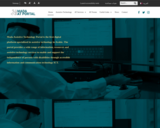
Mada Assistive Technology Portal is the first digital platform specialized in assistive technology in Arabic. The portal provides a wide range of information, resources and assistive technology services to enable and support the independence of persons with disabilities through accessible information and communication technology ICT.

Positive Behavior Support (PBS) is a set of research-based strategies used to increase quality of life and decrease problem behavior by teaching new skills and making changes in a person’s environment. Here is a PowerPoint presentation that will help parents better understand how they can help their child through challenging behaviors.
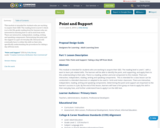
This module is intended for students who are working to acquire their GED. The reading level is Level C which is at a 4th-5th-grade reading level for learners who are interested in learning how to call in sick from work. There are interactive, independent, reading, writing and speaking components. Determining the point and the support is a part of everyday life. Everyone will eventually have to utilize this skill on their jobs, specifically understanding the procedures for taking a day off from work.
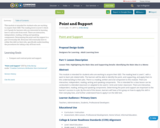
This module is intended for students who are working to acquire their GED. The reading level is Level C which is 4-5 grade for learners who are interested in learning how to call in sick from work. There are interactive, independent, reading, writing and speaking components. Determining the point and the support is a part of everyday life. Everyone will eventually have to utilize this skill on their jobs, specifically understanding the procedures for taking a day off from work.
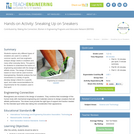
Students explore why different types of sneakers are used in a variety of common sports, and how engineers analyze design needs in sneakers and many other everyday items. The goal is for students to understand the basics of engineering associated with the design of athletic shoes. The design of footware based on how it will be used involves bioengineering. Students analyze the foot movements in a variety of sports, develop design criteria for a specific sport, and make recommendations for requirements for the sneakers used in that sport.
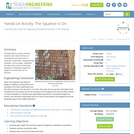
Through hands-on group projects, students learn about the force of compression and how it acts on structural components. Using everyday materials, such as paper, toothpicks and tape, they construct structures designed to (hopefully) support the weight of a cinder block for 30 seconds.
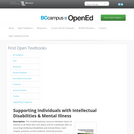
This multidisciplinary resource develops topics of interest to all those who care about and for individuals with co-occurring intellectual disabilities and mental illness. Each chapter presents current evidence informed practice knowledge. Each topic is also presented with audio enabled text boxes emphasizing 'Key Points for Caregivers.' For those who are interested in background knowledge, we provided the comprehensive literature base. And, for those interested mainly in 'what to do,' we provided text box summaries for reading and listening.
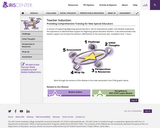
A revision of Supporting Beginning Special Educators: Tips for Educational Leaders, this Module emphasizes the importance of administrative support for beginning special education teachers. It also demonstrates how teacher support can increase the teacher's effectiveness in the classroom (est. completion time: 1 hour).
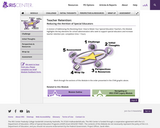
A revision of Addressing the Revolving Door: How to Retain Your Special Education Teachers, this Module highlights the key elements for school administrators who seek to support special educators and increase teacher retention (est. completion time: 1 hour).

The main goal of this course is to study the generalization ability of a number of popular machine learning algorithms such as boosting, support vector machines and neural networks. Topics include Vapnik-Chervonenkis theory, concentration inequalities in product spaces, and other elements of empirical process theory.

This resource is a video abstract of a research paper created by Research Square on behalf of its authors. It provides a synopsis that's easy to understand, and can be used to introduce the topics it covers to students, researchers, and the general public. The video's transcript is also provided in full, with a portion provided below for preview:
"Help from a co-worker is generally viewed as a good thing. But that isn’t always the case. Researchers are exploring an often-ignored form of help that is not always welcomed by those receiving it. It’s called anticipatory help. Anticipatory help is when an employee anticipates the needs of a co-worker and offers or provides help on a task without being asked to do so. That anticipatory help is unsolicited is what distinguishes it from reactive help, which is assisting a co-worker who has explicitly asked for help. According to the team behind the study, a prevailing viewpoint in organizational scholarship is that employees who help their co-workers generally receive positive reactions. But this perspective is based on research that has not deliberately differentiated the outcomes of anticipatory helping from reactive helping..."
The rest of the transcript, along with a link to the research itself, is available on the resource itself.

In this lab, students will learn how to make an assumption and how to support their assumption. They will be able to achieve this goal by participating in a Spy Game, where students will ask questions to acquire enough information to make an educated guess.

In this lesson, students will hone their investigative skills and form an opinion based on the credible evidence that they uncover. After learning about the decision to deem Pluto a "dwarf planet," students will have time for individual investigation. After using their background knowledge to choose credible sources, they will analyze the information they gather to form their own opinion, which they will support in a video response to a prompt on Flipgrid.
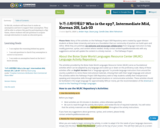
In this lab, students will learn how to make an assumption and how to support their assumption. They will be able to achieve this goal by participating in a Spy Game, where students will ask questions to acquire enough information to make an educated guess.